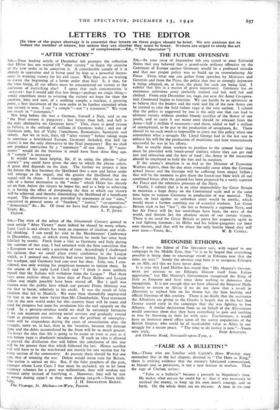Sta,—The view of the editor of the Nineteenth Century quoted
in your article "After Victory" must indeed be shared by many others. Lord Cecil is and always has been an exponent of idealism and wish- ful thinking. I can recall his visit to the Headmasters' Conference in December, 1933, at which every forecast he made has since been falsified by events. Fresh from a visit to Germany and Italy during the summer of that year, I had returned with the firm conviction that a European war was only a question of time. Accordingly I challenged his opinion that we could place every confidence in the League which, as I pointed out, America had never joined, Japan had made her washpot, and Germany had cast over her shoe. Italy, too, I con- sidered, was only waiting the propitious moment to imitate them. In the course of his reply Lord Cecil said "1 think it most unlikely myself that the Italians will withdraw from the League." Had there been more realism about in those days of Peace Ballots and League rallies war might possibly have been staved off. But a spell was thrown over the public here which our present Prime Minister was the first to break, infinitely to his credit. It was the result of false idealism that led to Munich. We were then shamefully unprepared for war as no one knew better than Mr. Chamberlain. Your statement that in the new world order for this country there will be room and need for progress but none for revolution hits the nail squarely on the head. In a poverty-stricken world we shall be extremely fortunate if we can maintain our existing social services and gradually extend them as prosperity revives. In any case the problem of unemploy- ment will be stupendous during the years of resuscitation after the struggle, more so, in fact, than in the 'twenties, because the damage done and the debts accumulated by the State will be so much greater. To foster the idea that life is going to be easier or even as easy as it was before 5939 is absolutely mischievous. If such an idea is allowed to prevail the disillusion that will follow the conclusion of this war will be far greater than that which followed the last. Hence sacrifice will still have to be the watchword not merely for one section but for every section of the community. At present there should be but one aim, that of winning the war. Defeat would mean ruin for Britain. The nation is united on this. But, if the false prophets of the past, amongst whom Lord Cecil I fear must be included, are to let loose visionary schemes for a post war millennium, they will weaken our national unity instead of fortifying it. Moreover, they will .be just as wrong during 1939-? as they were during 1914-01—Yours faith-










































 Previous page
Previous page